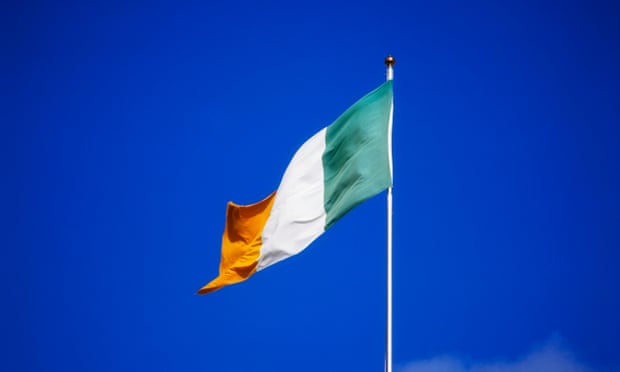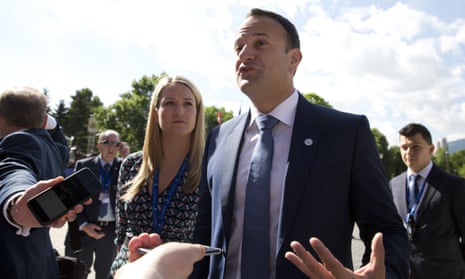The Irish taoiseach, Leo Varadkar, has raised the prospect of the UK crashing out of the EU without a deal if UK government infighting continues over the next few weeks.
With the Brexit negotiations stalling and Theresa May failing to offer any further solutions to avoid a hard border between Northern Ireland and the republic, Varadkar made his growing concern clear before meeting the UK prime minister at an EU summit in the Bulgarian capital, Sofia.
The taoiseach said next month’s European council summit would be a key moment for the talks, despite attempts by the Brexit secretary, David Davis, and others in the UK government to play down suggestions of a “deadline”.
Quick GuideWhy is the Irish border a stumbling block for Brexit?
Show

Counties and customs
Inside the EU, both Ireland and Northern Ireland are part of the single market and customs union so share the same regulations and standards, allowing a soft or invisible border between the two.
Britain’s exit from the EU – taking Northern Ireland with it – risks a return to a hard or policed border. The only way to avoid this post-Brexit is for regulations on both sides to remain more or less the same in key areas including food, animal welfare, medicines and product safety.
The 'backstop' in Theresa May's Withdrawal Agreement was intended to address this - stating that if no future trade agreement could be reached between the EU and the UK, then rules and regulations would stay as they are. This has been rejected by Brexit supporters as a 'trap' to keep the UK in the EU's customs union, which would prevent the UK striking its own independent trade deals.
There are an estimated 72m road vehicle crossings a year between Northern Ireland and the Republic of Ireland, and about 14% of those crossings are consignments of goods, some of which may cross the border several times before they reach a consumer. Brexit supporters say this can be managed by doing checks on goods away from the border, but critics say it will be difficult to police this without any physical infrastructure like border posts or cameras, which could raise tensions in the divided communities of Ireland.
Interactive: A typical hour in the life of the Irish border
The European council president, Donald Tusk, is also due to meet the prime minister in Sofia.
The disagreements within May’s cabinet at this late stage of negotiations have been described by sources as “shocking”.
Varadkar said that the EU and Dublin had “yet to see anything that remotely approaches” a way out of the current impasse.
“By June we need to see substantial progress as the tánaiste [Varadkar’s deputy, Simon Coveney] and I have said on many occasions. The European council will review progress in June. The deadline of course for the withdrawal agreement is October, but if we are not making real and substantial progress by June then we need to seriously question whether we’re going to have a withdrawal agreement at all.”
The UK government has vowed to find an arrangement that will avoid the need for border checks between the Republic of Ireland and Northern Ireland, and to table a “backstop” solution involving regulatory alignment with the EU.
Varadkar said: “We need to have that backstop because that gives us the assurance that there will be no hard border on our island. So we stand by our position that there can be no withdrawal agreement without that backstop.
“If the UK wants to put forward alternatives … we’re willing to examine that. But we need to see it written down in black and white and know that its workable and legally operable. And we’ve yet to see anything that remotely approaches that.”
EU leaders are due to meet on 29 June, after which it is hoped in London that Brussels will start drafting a political declaration on a future trade deal. The UK government this week promised to produce a 100-page white paper on the future trading relationship. But the paper could be largely ignored at the summit unless the Irish question is solved to the satisfaction of Dublin and Brussels.
Last month, Davis dismissed the June deadline as a negotiating tactic. “One of the things that happens in negotiations is people try to set up deadlines, sometimes artificial deadlines, to put pressure on one element of the negotiation which they think is in their favour,” he said.
